More entertaining and interesting in theory than in practice, Destry Rides Again is one of those canonized classics that I possibly just don’t get. Perhaps I was expecting too much walking into this film, but I found its combination of western and comedy too broad. As a straight-up western, it’s fun and enjoyable with elements of comedy and farce spliced in at around. But it’s not the out-and-out classic that it’s been heralded as.
The story is pure cowboy as it concerns a corrupt little town called Bottleneck losing it’s mayor to machinations of the evil gangster whose truly in charge, hiring up the town drunk (who ends up taking the position seriously) and the new mayor’s quest to bring back Destry, his former partner. The comedy comes in two forms: James Stewart as Destry, but he’s not the drunken mayor’s old buddy, he’s the pacifist son. And, of course, in Marlene Dietrich who is seen here sending up not just any image of herself, but the enduring, classic and iconic image that had been meticulously sculpted and cultivated through seven films with Josef von Sternberg.
When Stewart and Dietrich are left to radiate their own particular brands of movie star magic, they’re immensely electrifying and watchable. It’s the uneven writing that really sinks the whole affair. Stewart’s Destry is a pacifist until the final act requires him to weapon up and charge into battle. Despite spending 75% of the movie preaching on and on about nonviolence and cleverly settling disagreements using wit and charm, this sudden change is never smoothed over nor given any dramatic heft. I’d think that a man like Destry would feel burdened by the fact that he’s now got to go into battle and kill his enemies.
But this is really Dietrich’s show, and her joy in the role is positively palpable. She’s clearly having fun turning her exotic “Other” persona on its ear and revealing herself to be a major player in the town’s political structure. Her transformation from dangerous femme fatale sexpot to heroic saloon girl is more smoothly transitioned, only really troublesome in the fact that the director decided to play the female uprising and exhibitions of competence for laughs. While it may not be the classic that the hype has made it out to be, it’s still a very enjoyable, well-made and fun movie.
Destry Rides Again
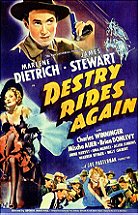 Posted : 12 years, 9 months ago on 27 August 2012 09:06
(A review of Destry Rides Again)
Posted : 12 years, 9 months ago on 27 August 2012 09:06
(A review of Destry Rides Again) 0 comments, Reply to this entry
0 comments, Reply to this entry
Doctor Strange: The Sorcerer Supreme
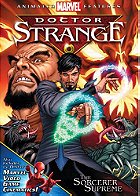 Posted : 12 years, 9 months ago on 27 August 2012 09:06
(A review of Doctor Strange: The Sorcerer Supreme)
Posted : 12 years, 9 months ago on 27 August 2012 09:06
(A review of Doctor Strange: The Sorcerer Supreme)Well, at least this one was a little better than Invincible Iron Man, but not by that much really. It still suffers from the same problems, chiefly that the story spends far too much time getting going without introducing or building its villain or many secondary characters up much before employing them all in the grand finale. Oh, and the animation is still high-quality TV work, and nothing much else.
Funnily enough, I seem to remember Dr. Stephen Strange being more a braggart and a prick but still somehow loveable than the whiny dope he’s portrayed as being in this film. (Think of how Robert Downey Jr. plays Tony Stark, that’s really more like the comic book version of Strange.) And what’s with saddling him with the unnecessary time eater of a backstory? He failed to save his sister as a surgeon, what does this have to do with anything else in the film? Not much really.
I will give the film this, when it’s interesting, it’s very engaging. But at roughly an hour and fifteen minutes, taking up forty-five minutes to setup the main conflict(s) and your main character’s backstory is just poor writing. Dormammu, who is given a radical and unique makeover in this film – I loved it, is mostly just a fiery demonic creature that screams and says three lines. He should have had more weight and presence. Introducing your main villain in brief glimpses at the start of the film, abandoning him for the soggy middle, and then bringing him back for the last ten minutes is not a wise decision.
So what is interesting? Anything involving the world of sorcery is fascinating, even if it is given the short end of the stick. A whole series could have been made out of this concept, why haven’t they done this yet? There’s enough unique and interesting material here to occupy a steady run on Disney XD. The dark magic creatures alone are beautifully designed and don’t quite look like anything else that’s come out of a superhero movie or TV show. I’d watch a show just to see what new dark, twisted hellish creatures come out of the world of our nightmarish imagination to wreak havoc.
I just don’t understand Marvel’s insistence on a paint-by-numbers approach to both their live action and animated movie properties. They have more than anything history and rich mythology to pull from to experiment and play with and truly give DC a run for their money. Even something as atrocious as All-Star Superman kept me engaged because it did something different with the property. Even if it’s an interesting failure, at least make it interesting.
Funnily enough, I seem to remember Dr. Stephen Strange being more a braggart and a prick but still somehow loveable than the whiny dope he’s portrayed as being in this film. (Think of how Robert Downey Jr. plays Tony Stark, that’s really more like the comic book version of Strange.) And what’s with saddling him with the unnecessary time eater of a backstory? He failed to save his sister as a surgeon, what does this have to do with anything else in the film? Not much really.
I will give the film this, when it’s interesting, it’s very engaging. But at roughly an hour and fifteen minutes, taking up forty-five minutes to setup the main conflict(s) and your main character’s backstory is just poor writing. Dormammu, who is given a radical and unique makeover in this film – I loved it, is mostly just a fiery demonic creature that screams and says three lines. He should have had more weight and presence. Introducing your main villain in brief glimpses at the start of the film, abandoning him for the soggy middle, and then bringing him back for the last ten minutes is not a wise decision.
So what is interesting? Anything involving the world of sorcery is fascinating, even if it is given the short end of the stick. A whole series could have been made out of this concept, why haven’t they done this yet? There’s enough unique and interesting material here to occupy a steady run on Disney XD. The dark magic creatures alone are beautifully designed and don’t quite look like anything else that’s come out of a superhero movie or TV show. I’d watch a show just to see what new dark, twisted hellish creatures come out of the world of our nightmarish imagination to wreak havoc.
I just don’t understand Marvel’s insistence on a paint-by-numbers approach to both their live action and animated movie properties. They have more than anything history and rich mythology to pull from to experiment and play with and truly give DC a run for their money. Even something as atrocious as All-Star Superman kept me engaged because it did something different with the property. Even if it’s an interesting failure, at least make it interesting.
 0 comments, Reply to this entry
0 comments, Reply to this entry
The Fall of the Roman Empire
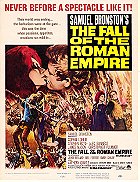 Posted : 12 years, 10 months ago on 24 August 2012 07:50
(A review of The Fall of the Roman Empire)
Posted : 12 years, 10 months ago on 24 August 2012 07:50
(A review of The Fall of the Roman Empire)Epics are hard. It’s very easy to give in to the bloated pageantry of much of the genre, but terribly hard to ascend beyond it. Too many stars want their screen-time, too much story even for a four hour running time, too much pomp and circumstance with little actual meat to sustain yourself, I’m thinking of something like The Ten Commandments. Or the well-intentioned but complete misfire that is Raintree County.
So thank god for Anthony Mann and his two epics-with-brains, El Cid and the far superior The Fall of the Roman Empire. What he manages to do with this sweeping, all engrossing, completely riveting film is show how the rot within the Roman Empire began their downfall and managed to expedite it through political in-fighting and various other problems.
It helps to be blessed with a ridiculously talented multi-cultural cast including Alec Guinness, Christopher Plummer, Sophia Loren, Stephen Boyd, Mel Ferrer, James Mason and Omar Sharif. The cast does their best with some of the more tin-eared lines and obvious stating of themes, and generally performs at a very high level. The costumes, sets, and overall production is ornate, beautiful and a veritable feast for the senses.
The sprawling and epic plot involves various internal fissures amongst a royal family – the dead father choosing an outsider to succeed him to the throne, the tyrannical and power-mad son seizing control, the philosophical sister being ushered away from her lover and into the arms of an enemy; it’s all been well-covered before and since. But Mann offers up something more intelligent this time around. Perhaps it’s because this theme of systems rotting from within and collapsing under personal vendettas was his métier. It’s a dark, more ambitious, more serious work than it’s spiritual cousin El Cid, and despite its problems, an all-around better movie. (No disrespect meant to El Cid, that’s another unique, brainy and interesting grandiose epic from this period in film-making.)
And perhaps much of my love for the movie has to do with the fact that it doesn’t shy away from violence. These people by and large do not die in glamorous, blood-free ways. There’s no artistically held pose as they slink down in wide-eyed bewilderment or soft-focused close-ups as they heroically meet their maker. When James Mason’s character gets tortured, there’s a real sense of dread, horror and pain being inflicted upon him. And in Plummer and Boyd’s opposing ideologies and forces, a sense of two sides clashing and cancelling each other out while the schemes playing both sides make their power plays and pick up whatever pieces are left. The Fall of the Roman Empire wasn’t out of fashion, it was just ahead of the curve.
So thank god for Anthony Mann and his two epics-with-brains, El Cid and the far superior The Fall of the Roman Empire. What he manages to do with this sweeping, all engrossing, completely riveting film is show how the rot within the Roman Empire began their downfall and managed to expedite it through political in-fighting and various other problems.
It helps to be blessed with a ridiculously talented multi-cultural cast including Alec Guinness, Christopher Plummer, Sophia Loren, Stephen Boyd, Mel Ferrer, James Mason and Omar Sharif. The cast does their best with some of the more tin-eared lines and obvious stating of themes, and generally performs at a very high level. The costumes, sets, and overall production is ornate, beautiful and a veritable feast for the senses.
The sprawling and epic plot involves various internal fissures amongst a royal family – the dead father choosing an outsider to succeed him to the throne, the tyrannical and power-mad son seizing control, the philosophical sister being ushered away from her lover and into the arms of an enemy; it’s all been well-covered before and since. But Mann offers up something more intelligent this time around. Perhaps it’s because this theme of systems rotting from within and collapsing under personal vendettas was his métier. It’s a dark, more ambitious, more serious work than it’s spiritual cousin El Cid, and despite its problems, an all-around better movie. (No disrespect meant to El Cid, that’s another unique, brainy and interesting grandiose epic from this period in film-making.)
And perhaps much of my love for the movie has to do with the fact that it doesn’t shy away from violence. These people by and large do not die in glamorous, blood-free ways. There’s no artistically held pose as they slink down in wide-eyed bewilderment or soft-focused close-ups as they heroically meet their maker. When James Mason’s character gets tortured, there’s a real sense of dread, horror and pain being inflicted upon him. And in Plummer and Boyd’s opposing ideologies and forces, a sense of two sides clashing and cancelling each other out while the schemes playing both sides make their power plays and pick up whatever pieces are left. The Fall of the Roman Empire wasn’t out of fashion, it was just ahead of the curve.
 0 comments, Reply to this entry
0 comments, Reply to this entry
High Society
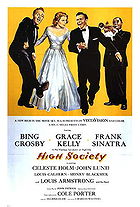 Posted : 12 years, 10 months ago on 24 August 2012 07:49
(A review of High Society)
Posted : 12 years, 10 months ago on 24 August 2012 07:49
(A review of High Society)By the time High Society was released the MGM musical machine was already in the midst of breaking down, so it shouldn’t come as a surprise that the whole thing is plagued with problems from start to finish. But at least there’s enough movie star charisma, cute if unmemorable songs, and ridiculously lavish colors to entertain you.
A musical version of The Philadelphia Story, High Society grafts onto that basic premise Louis Armstrong and his band as a kind of Greek chorus who introduce us to the main conflict through a calypso-jazz opening song and comment on the proceedings from the sidelines throughout. It works, mostly, and Armstrong gets a few charming moments to steal the spotlight from hyper-talented crooners Frank Sinatra and Bing Crosby.
And while it may not have the same level of talent working behind the camera as The Philadelphia Story, at least we’re given three central performances which radiate charm and old fashioned magic. Frank Sinatra and Celeste Holm make a wonderful duo, and Holm in particular is egregiously underused. And while I’m normally very hard on Grace Kelly (you try not to cringe watching her trying desperately to emote in High Noon!), I find her limited abilities as an actress put to fantastic use in the trio of films she made with Alfred Hitchcock and this film, her last before becoming Princess Grace.
She’s perfectly cast as a New England blue blood, and her performance is charming, funny, elegant and simply divine. Light comedy serves her well, and her singing while not mind-blowing is perfectly fine and serviceable, like Audrey Hepburn in Funny Face. Bing Crosby mostly sleepwalks through his role, only bothering to show his natural spark in two scenes, one with Frank Sinatra (“Well, Did You Evah!”) and another with Louis Armstrong (“Now You Has Jazz”).
Perhaps if the rest of the movie had been brought up to the energy level of those two scenes, and maybe if Celeste Holm hadn’t been criminally underwritten (she is particularly great hurling out sarcastic quips), High Society could’ve been something better. As it is, it’s entertaining for the most part, but it never distances itself away from the shadow of The Philadelphia Story to really make its presence worthwhile. If that movie had too much clever dialog for you, well, here’s one with indifferent scenes in-between clever musical numbers.
A musical version of The Philadelphia Story, High Society grafts onto that basic premise Louis Armstrong and his band as a kind of Greek chorus who introduce us to the main conflict through a calypso-jazz opening song and comment on the proceedings from the sidelines throughout. It works, mostly, and Armstrong gets a few charming moments to steal the spotlight from hyper-talented crooners Frank Sinatra and Bing Crosby.
And while it may not have the same level of talent working behind the camera as The Philadelphia Story, at least we’re given three central performances which radiate charm and old fashioned magic. Frank Sinatra and Celeste Holm make a wonderful duo, and Holm in particular is egregiously underused. And while I’m normally very hard on Grace Kelly (you try not to cringe watching her trying desperately to emote in High Noon!), I find her limited abilities as an actress put to fantastic use in the trio of films she made with Alfred Hitchcock and this film, her last before becoming Princess Grace.
She’s perfectly cast as a New England blue blood, and her performance is charming, funny, elegant and simply divine. Light comedy serves her well, and her singing while not mind-blowing is perfectly fine and serviceable, like Audrey Hepburn in Funny Face. Bing Crosby mostly sleepwalks through his role, only bothering to show his natural spark in two scenes, one with Frank Sinatra (“Well, Did You Evah!”) and another with Louis Armstrong (“Now You Has Jazz”).
Perhaps if the rest of the movie had been brought up to the energy level of those two scenes, and maybe if Celeste Holm hadn’t been criminally underwritten (she is particularly great hurling out sarcastic quips), High Society could’ve been something better. As it is, it’s entertaining for the most part, but it never distances itself away from the shadow of The Philadelphia Story to really make its presence worthwhile. If that movie had too much clever dialog for you, well, here’s one with indifferent scenes in-between clever musical numbers.
 0 comments, Reply to this entry
0 comments, Reply to this entry
The Beautiful Blonde from Bashful Bend
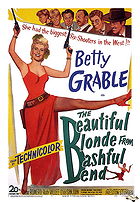 Posted : 12 years, 10 months ago on 24 August 2012 07:49
(A review of The Beautiful Blonde from Bashful Bend)
Posted : 12 years, 10 months ago on 24 August 2012 07:49
(A review of The Beautiful Blonde from Bashful Bend)Oh, Preston Sturges, I know this movie isn’t anywhere near the same league as Sullivan’s Travels, The Lady Eve or Unfaithfully Yours, but I see what you were trying to accomplish here. If only the Production Code, Betty Grable and everything else about this film’s path to the screen hadn’t been a giant obstacle course. That the film came out even remotely entertaining is a testament to your talents as a writer, producer and director.
In trying to create a rowdy good time, he got the perfect actress to play someone sexy and always looking for a good time, but Betty Grable didn’t want to expand herself as an actress or change up her persona too much. And Sturges clearly wanted her to expand beyond her normal persona (notice that her legs are covered up for most of the film) and prove her worth; or, he wanted a completely different actress for the part. The truth is probably somewhere in-between.
And while writing the film, it’s clear that most of the salacious stuff has been exercised out. This leaves behind several supporting characters that don’t do much, drift in and out, and give the film a weak support structure to build itself off of. And many of the gags are cheaper than what you’d find mixed in with his more well-known films.
But, if only, he hadn’t encountered any of these problems. I’m not saying it would of turned out as fabulous as The Lady Eve, but it would have been better than this amiable, enormously flawed film. This didn’t deserve to kill his directorial career, not by a long shot. Other directors made far worse films but keep cranking them out. But such is the unfairness of life.
In trying to create a rowdy good time, he got the perfect actress to play someone sexy and always looking for a good time, but Betty Grable didn’t want to expand herself as an actress or change up her persona too much. And Sturges clearly wanted her to expand beyond her normal persona (notice that her legs are covered up for most of the film) and prove her worth; or, he wanted a completely different actress for the part. The truth is probably somewhere in-between.
And while writing the film, it’s clear that most of the salacious stuff has been exercised out. This leaves behind several supporting characters that don’t do much, drift in and out, and give the film a weak support structure to build itself off of. And many of the gags are cheaper than what you’d find mixed in with his more well-known films.
But, if only, he hadn’t encountered any of these problems. I’m not saying it would of turned out as fabulous as The Lady Eve, but it would have been better than this amiable, enormously flawed film. This didn’t deserve to kill his directorial career, not by a long shot. Other directors made far worse films but keep cranking them out. But such is the unfairness of life.
 0 comments, Reply to this entry
0 comments, Reply to this entry
Laurence Olivier's Hamlet
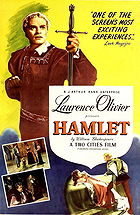 Posted : 12 years, 10 months ago on 24 August 2012 07:48
(A review of Hamlet (1948))
Posted : 12 years, 10 months ago on 24 August 2012 07:48
(A review of Hamlet (1948))Sir Laurence Olivier might have taken a pair of sheers and pruned off much of the text (including any and all comic relief), but what he left is some terrific stuff. Sure, he’s clearly too old to be Hamlet, and others are too young or don’t look exactly right, but, and this is important in each of Sir Laurence’s Shakespearean adaptations, this version was his individualized point-of-view on the character. It wasn’t just “doing” Shakespeare. He was adapting and reinterpreting Shakespeare.
This version is mostly filmed in very obviously fake sets, both interior and exterior, and while this can lead to moments of static and dull viewing, it also helps place us inside a psycho-sexual Freudian liar in which a prickish royal is about to showcase for our entertainment all of his disturbed psyche. So while Olivier is obviously too old for his role while others are too young, this actually starts to make logical sense the further into Hamlet’s psyche we delve.
The unresolved issues with his mother and his cruel treatment of Ophelia let me see the connections as to why they’re both cast so much younger than they probably should be. Hamlet cannot reconcile his sexual longings for a maternal figure, and this borderline-psycho child isn’t the answer. (Especially the mother, who looks maybe even slightly younger than Olivier was at the time.) And there’s a neat trick involving the ghost of Hamlet’s father. It appears to him as a talking skeleton still dressed in his royal garments through fogs of smoke speaking to him in a modulated voice. The voice is Hamlet’s own, pitched and distorted to be both slower and lower. Perhaps there never was a ghost; perhaps Hamlet was schizophrenic all along.
Highly atmospheric and very intriguing, Hamlet does suffer from a few ideas which drain some of the passion and large-scale emotions from the play. The interiorized “To be or not to be” speech has its defenders, but I am not amongst their ranks. I find that interiorizing that soliloquy drains it of much of its power. Or maybe it’s just that Olivier didn’t emote enough in his line readings to really punch it all home. He does a interesting bit of busyness in which he loving, borderline romantically, places the skull next to his face, holding it tenderly, like a lover. And since nearly two hours was removed from the play, some characters naturally got the short-end of the stick. The removal of any humor works, but Ophelia’s descent into madness feels slightly abrupt. But Jean Simmons’ creepy speak-sing after the break from sanity works effectively.
Sometimes experimenting with the camera and its various tricks just got the better of him. No matter, this is still one of the better filmed Shakespeare adaptations to come along. If this is any indication, I’m probably going to greatly enjoy Olivier’s versions of Henry V, Richard III, and Othello, which he may not have directed, but it was based on his stage version.
This version is mostly filmed in very obviously fake sets, both interior and exterior, and while this can lead to moments of static and dull viewing, it also helps place us inside a psycho-sexual Freudian liar in which a prickish royal is about to showcase for our entertainment all of his disturbed psyche. So while Olivier is obviously too old for his role while others are too young, this actually starts to make logical sense the further into Hamlet’s psyche we delve.
The unresolved issues with his mother and his cruel treatment of Ophelia let me see the connections as to why they’re both cast so much younger than they probably should be. Hamlet cannot reconcile his sexual longings for a maternal figure, and this borderline-psycho child isn’t the answer. (Especially the mother, who looks maybe even slightly younger than Olivier was at the time.) And there’s a neat trick involving the ghost of Hamlet’s father. It appears to him as a talking skeleton still dressed in his royal garments through fogs of smoke speaking to him in a modulated voice. The voice is Hamlet’s own, pitched and distorted to be both slower and lower. Perhaps there never was a ghost; perhaps Hamlet was schizophrenic all along.
Highly atmospheric and very intriguing, Hamlet does suffer from a few ideas which drain some of the passion and large-scale emotions from the play. The interiorized “To be or not to be” speech has its defenders, but I am not amongst their ranks. I find that interiorizing that soliloquy drains it of much of its power. Or maybe it’s just that Olivier didn’t emote enough in his line readings to really punch it all home. He does a interesting bit of busyness in which he loving, borderline romantically, places the skull next to his face, holding it tenderly, like a lover. And since nearly two hours was removed from the play, some characters naturally got the short-end of the stick. The removal of any humor works, but Ophelia’s descent into madness feels slightly abrupt. But Jean Simmons’ creepy speak-sing after the break from sanity works effectively.
Sometimes experimenting with the camera and its various tricks just got the better of him. No matter, this is still one of the better filmed Shakespeare adaptations to come along. If this is any indication, I’m probably going to greatly enjoy Olivier’s versions of Henry V, Richard III, and Othello, which he may not have directed, but it was based on his stage version.
 0 comments, Reply to this entry
0 comments, Reply to this entry
Around the World in 80 Days
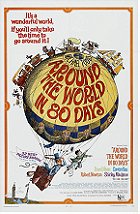 Posted : 12 years, 10 months ago on 24 August 2012 07:48
(A review of Around the World in 80 Days (1956))
Posted : 12 years, 10 months ago on 24 August 2012 07:48
(A review of Around the World in 80 Days (1956))Whenever anyone talks about bloated, brain-dead, insufferable star-riddled epics from the 1950s, the type of movie that they’re talking about is Around the World in 80 Days. As a picturesque travelogue of the entire globe, it can’t be beat. As an engaging story with well-developed characters, it leaves one wanting.
As all razzle-dazzle spectacles go, I suppose you could do worse. And perhaps it is impossible to make a movie out of Around the World in 80 Days that’s dramatically engaging, but this is still boring. Watch it for the cavalcade of guest spots and cameos in the film, most of which linger on the star for a prolonged period of time before moving on to the next one in this section. My personal favorites are Buster Keaton as the train conductor, although hearing the great silent clown speak is a little jarring at first, and the trio of Marlene Dietrich, George Raft and Frank Sinatra in a California saloon. And watch it for the beautiful images that they filmed in various places all over the world. There’s a lot of showmanship on display, pity it never adds up to anything interesting.
As all razzle-dazzle spectacles go, I suppose you could do worse. And perhaps it is impossible to make a movie out of Around the World in 80 Days that’s dramatically engaging, but this is still boring. Watch it for the cavalcade of guest spots and cameos in the film, most of which linger on the star for a prolonged period of time before moving on to the next one in this section. My personal favorites are Buster Keaton as the train conductor, although hearing the great silent clown speak is a little jarring at first, and the trio of Marlene Dietrich, George Raft and Frank Sinatra in a California saloon. And watch it for the beautiful images that they filmed in various places all over the world. There’s a lot of showmanship on display, pity it never adds up to anything interesting.
 0 comments, Reply to this entry
0 comments, Reply to this entry
Cactus Flower
 Posted : 12 years, 10 months ago on 2 August 2012 09:25
(A review of Cactus Flower)
Posted : 12 years, 10 months ago on 2 August 2012 09:25
(A review of Cactus Flower)A cute and fun sexual farce, Cactus Flower is occasionally forgettable, but highly entertaining. The plot has all the makings of a great screwball comedy, but the clearly stage-bound origins of the material are never given the proper film conversion.
Walter Matthau, the great curmudgeon as I lovingly think of him, plays a dentist who lies to his decades younger girlfriend about being married. If he’s “married,” he doesn’t have to marry his cooky, hippie “mistress,” played incredibly well by Goldie Hawn. So, instead of telling his girlfriend the truth about his bachelorhood, he enlists his secretary, Ingrid Bergman proving the comedic surprise and delight of the film, to stand-in as a wife. Couple swapping and romantic entanglements naturally ensue.
That it never rises to greatness isn’t that much of a problem when you consider the three leads. Bergman, having spent most of her career elegantly suffering and being the definition of luminous, is having a ball playing for laughs. Her comfort-level with comedy is astounding when you consider how often she’s associated with serious, prestige dramas like Casablanca in our collective memory. Matthau is in fine form and Hawn proves to be a sparkplug whenever the film needs it. They’ve been better (The Fortune Cookie and Private Benjamin leap immediately to mind), but the three of them together create some real sparks. It’s a pity they couldn’t have been put together in a better film.
Walter Matthau, the great curmudgeon as I lovingly think of him, plays a dentist who lies to his decades younger girlfriend about being married. If he’s “married,” he doesn’t have to marry his cooky, hippie “mistress,” played incredibly well by Goldie Hawn. So, instead of telling his girlfriend the truth about his bachelorhood, he enlists his secretary, Ingrid Bergman proving the comedic surprise and delight of the film, to stand-in as a wife. Couple swapping and romantic entanglements naturally ensue.
That it never rises to greatness isn’t that much of a problem when you consider the three leads. Bergman, having spent most of her career elegantly suffering and being the definition of luminous, is having a ball playing for laughs. Her comfort-level with comedy is astounding when you consider how often she’s associated with serious, prestige dramas like Casablanca in our collective memory. Matthau is in fine form and Hawn proves to be a sparkplug whenever the film needs it. They’ve been better (The Fortune Cookie and Private Benjamin leap immediately to mind), but the three of them together create some real sparks. It’s a pity they couldn’t have been put together in a better film.
 0 comments, Reply to this entry
0 comments, Reply to this entry
Clash by Night
 Posted : 12 years, 10 months ago on 2 August 2012 09:25
(A review of Clash by Night)
Posted : 12 years, 10 months ago on 2 August 2012 09:25
(A review of Clash by Night)A little purple prose-y around the edges, but still infinitely watchable and entertaining thanks to the talents of Barbara Stanwyck in the lead and the supporting roles played by a then up-and-coming Marilyn Monroe and Keith Andes. It’s really two films jammed together and called the same name, each with its own complete dramatic arch.
Stanwyck plays a fallen woman who is returning to her coastal fishing town after a very long absence. She moves back in with her brother (Andes), and his factory worker girlfriend (Monroe), who idealizes and idolizes the imagined big city life that Stanwyck’s character may have led. Stanwyck claims she wants domesticity with Paul Douglas’ good-natured fisherman, but she really wants to re-embrace her inner bad girl with Robert Ryan’s gruff film projectionist. And the first section of the drama ends with Stanwyck choosing a domestic life with Douglas and giving birth to a daughter.
Part two picks up with Stanwyck making Douglas a cuckold, and she’s ready to throw it all away when Douglas disappears with their baby. Now she must chose which of these two men, and their corresponding lifestyles, she will stick with. It shouldn’t come as much of a surprise which one ends up winning out. This is a melodrama from the 50s; all forms of female liberation and sexual agency must be punished and forced back into domestic tranquility, or some semblance thereof.
At times too overripe for its own good, at least Clash by Night can boast of its central performances being uniformly strong. Stanwyck made this kind of role her bread-and-butter, by this time she could do it in her sleep, but she never phones it in for a moment here. And Monroe proves what a capable actress she could be, and could have been, if given more challenging material to work with. Her working class girl is tough, independent, and has big dreams; perhaps it was a little autobiographical for her?
Stanwyck plays a fallen woman who is returning to her coastal fishing town after a very long absence. She moves back in with her brother (Andes), and his factory worker girlfriend (Monroe), who idealizes and idolizes the imagined big city life that Stanwyck’s character may have led. Stanwyck claims she wants domesticity with Paul Douglas’ good-natured fisherman, but she really wants to re-embrace her inner bad girl with Robert Ryan’s gruff film projectionist. And the first section of the drama ends with Stanwyck choosing a domestic life with Douglas and giving birth to a daughter.
Part two picks up with Stanwyck making Douglas a cuckold, and she’s ready to throw it all away when Douglas disappears with their baby. Now she must chose which of these two men, and their corresponding lifestyles, she will stick with. It shouldn’t come as much of a surprise which one ends up winning out. This is a melodrama from the 50s; all forms of female liberation and sexual agency must be punished and forced back into domestic tranquility, or some semblance thereof.
At times too overripe for its own good, at least Clash by Night can boast of its central performances being uniformly strong. Stanwyck made this kind of role her bread-and-butter, by this time she could do it in her sleep, but she never phones it in for a moment here. And Monroe proves what a capable actress she could be, and could have been, if given more challenging material to work with. Her working class girl is tough, independent, and has big dreams; perhaps it was a little autobiographical for her?
 0 comments, Reply to this entry
0 comments, Reply to this entry
Mysterious Skin
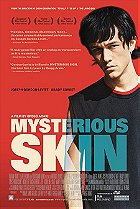 Posted : 12 years, 10 months ago on 2 August 2012 09:24
(A review of Mysterious Skin)
Posted : 12 years, 10 months ago on 2 August 2012 09:24
(A review of Mysterious Skin)I had long ago written off Gregg Araki as a filmmaker of limited emotional scope, as someone who tried vainly to shock and provoke and create garish, tacky films like Nowhere to rattle the mainstream. The soundtracks were pretty good though. And he could always pull in a unique set of up-and-comers (although, most of them didn’t really establish great careers. A lot of them have found work as supporting character actors in television and independent film, which isn’t so bad.)
But something funny happened with Mysterious Skin -- Araki grew up, gained some emotional maturity, and crafted a truly poignant and disturbing film. But some of his heightened filmmaking choices and acting cues to his cast still mar the film in spots. But, mostly, it’s his best, most fully realized and engaged work. It’s also some incredibly tough and disturbing material to work through.
The film follows the emotional journey of a gay teenage hustler (Joseph Gordon-Levitt) and an emotional stunted introvert with an obsession over alien abduction (Brady Corbett). The thing that binds them together is the childhood sexual abuse inflicted on them by their Little League coach. The painful, fractured shells that they’ve become are a reminder of the long-term effects of such abuse, and the two leads meet the challenges of the script. In fact, their performances are beautifully crafted and prove what talents they are, even at such young ages.
It’s the supporting cast and a few story beats that see Araki’s worst tendencies rear their ugly heads. Michelle Trachtenberg tries her best with her character, but just about anything involving her harkens back to the “Beverly Hills 90210-on-acid” aesthetic of films like The Doom Generation or Nowhere. It’s at its best when it focuses on the two boys, their lives after the fact, and the emotionally gutting finale in which Levitt fills in the memory gaps and explains to Corbett the systematic way in which they were abused, and how they had to groom each other for it. Harrowing stuff that will stick with you long after the movie is over.
But something funny happened with Mysterious Skin -- Araki grew up, gained some emotional maturity, and crafted a truly poignant and disturbing film. But some of his heightened filmmaking choices and acting cues to his cast still mar the film in spots. But, mostly, it’s his best, most fully realized and engaged work. It’s also some incredibly tough and disturbing material to work through.
The film follows the emotional journey of a gay teenage hustler (Joseph Gordon-Levitt) and an emotional stunted introvert with an obsession over alien abduction (Brady Corbett). The thing that binds them together is the childhood sexual abuse inflicted on them by their Little League coach. The painful, fractured shells that they’ve become are a reminder of the long-term effects of such abuse, and the two leads meet the challenges of the script. In fact, their performances are beautifully crafted and prove what talents they are, even at such young ages.
It’s the supporting cast and a few story beats that see Araki’s worst tendencies rear their ugly heads. Michelle Trachtenberg tries her best with her character, but just about anything involving her harkens back to the “Beverly Hills 90210-on-acid” aesthetic of films like The Doom Generation or Nowhere. It’s at its best when it focuses on the two boys, their lives after the fact, and the emotionally gutting finale in which Levitt fills in the memory gaps and explains to Corbett the systematic way in which they were abused, and how they had to groom each other for it. Harrowing stuff that will stick with you long after the movie is over.
 0 comments, Reply to this entry
0 comments, Reply to this entry
 Login
Login
 Home
Home 95 Lists
95 Lists 1531 Reviews
1531 Reviews Collections
Collections